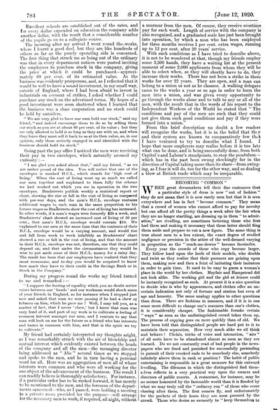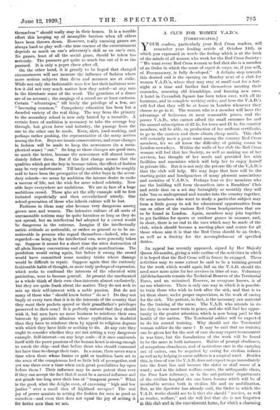BECOMING " COMMON "
WHEN great dressmakers tell their fine customers that a particular style of dress is now " out of fashion " they slo not mean that it is now rarely seen but that it is seen everywhere and has in faet " become common." They mean that a crowd of women who cannot afford to pay for novelty but can afford all the pretty things a week after the fair when they are no longer startling, are dressing up in them " to admir- ation," are rivalling, are sometimes bettering those who first had them and making it necessary that these latter should fling them aside and prepare to cut a new figure. The same thing is true about men to a less extent, the exact degree of studied negligence or precision in the attire of the well-dressed varying in proportion as the " reach-me-downs " become facsimiles.
Every year the crowds of those who copy become larger. They follow hard upon the heels of their models, who double and twist as they realize that their pursuers are gaining upon them, making now and then a feint of imitating their imitators in order to gain time. It used to be easy to guess a woman's place in the world by her clothes. Mayfair and Hampstead did not look alike. The working girl and the girl at leisure could be instantly recognized as such. At present it is a nice question to decide who is who by appearances, and clothes offer an un- certain indication not only of fortune and station but even of age and honesty. The same analogy applies to other questions than dress. There are fashions in manners, and if it is in one sense more difficult to change one's manners than one's clothes, it is considerably cheaper. The fashionable forsake certain " ways " as soon as the undistinguished crowd takes them up. The process of copying goes on more quickly than of old. We have been told that distinguished people are hard put to it to maintain their separation. How very much alike we all think and behave ! Clichés, tricks of voice and intonation, " airs " of all sorts have to be abandoned almost as, soon as they are learned. - Do we not constantly read of bad people in the news- papers who are fined and punished for successfully pretending in pursuit of their crooked ends to be somebody else, somebody infinitely above them in rank or position ? The habit of public entertaining is responsible in a great measure for this outward levelling. The dilemma in which the distinguished find them- salves reflects in a very practical way upon the owners and directors of public resorts. A restaurant, for instance, may be no sooner honoured by the fasionable world than it is flooded by what we may truly call the "ordinary run " of those who come chasing after them. The first comers fly, and unfortunately for the pockets of their hosts they are soon pursued by the crowd. *Those who desire so earnestly to " keep themselves to
themselves " should really stay in their homes. It is a terrible effort this keeping up of intangible barriers when all others have been thrown down. However, rc ally amusing games are always hard to play well—the true essence of the entertainment depends as much on one's adversary's skill as on one's own. No games, least of all the social game, should be taken too seriously. The pursuers get quite as much fun out of it as the pursued. It is only a paper chase after all.
On the other hand, it is greatly to be hoped that changed circumstances will not increase the influence of fashion where more serious subjects than dress and manners are at stake. While not only the fashionable were few but their imitators were few it did not very much matter how they acted—at any rate in the histrionic sense of the word. The gyrations of a dance are of no account ;. the surgings of a crowd are at least ominous. Certain " advantages," till lately the privilege of a few, are " becoming common." Compulsory education has been but a dwarfed variety of the real thing. The way from the primary to the secondary school is now only barred by a turnstile. A certain force of ambition is necessary to take the average boy through, but given force and industry, the passage from the one to the other can be made. Keen, alert, hard-working, and perhaps rather pushing, the representative of the many arrives among the few. Boys are innate conservatives, and some changes in fashion will be made to keep the newcomers (in a meta- phorical sense) " out." So long as those changes are good ones, so much the better, because the newcomers will almost imme- diately follow them. But if the first change means that the qualities which got the boy in become taboo, the effect of fashion may be very unfortunate. Till lately ambition might be roughly said to have been the prerogative of the abler boys in the secon- dary schools—we mean by ambition the intense desire to make a success of life, not the wish for mere school celebrity. Now able boys everywhere are ambitious. We are in face of a huge ambitious crowd. Those who set the silly example will be first imitated superficially and then overwhelmed utterly. One school-generation of those who inherit culture will be lost.
Fashions in ideas may also become very dangerous among grown men and women. The intensive culture of all sorts of unreasonable notions may be quite harmless so long as they do not spread, but an intellectual fad adopted by a crowd would be dangerous in the extreme. Imagine if the intellectually satiric attitude so noticeable, or rather so general as to be un- noticeable in persons who regard themselves—indeed, who are regarded—as being in the intellectual van, were generally taken up. Suppose it meant for a short time the utter destruction of all plain literary conventions and all simple moralizations. The pendulum would swing again, but before it swung the crowd would have committed some monkey tricks whose damage would be difficult to repair. Suppose again that the curiously fashionable habit of thought, or more truly perhaps of expression, which seeks to confound the interests of the educated with patriotism, were to become general. At present the uneducated as a whole think of their own class-interests almost exclusively, but they are quite frank about the matter. They do not seek to mix up their self-interest with a noble passion. But do not many of those who " should know better " do so ? Do they not imply at every turn that it is in the interests of the country that they want their pockets spared or their grandfather's privileges preserved to their sons ? It is perfectly natural that they should wish it, but men have no more business to reinforce their own interests by patriotic allusions whose application is doubtful than they have to reinforce them by appeal to religious dogmas with which they have little or nothing to do. At any rate they ought to consider whether they are not setting a very dangerous example. Self-interest—on any large scale—if it once confounds itself with the purer passions of the human heart is strong enough to wreck the ship—and that before those who should command her have time to change their tune. In a sense, there never was a time when those whose brains or gold or tradition have set in the seats of the conspicuous had so little left of prerogative, and yet was there ever a time when such great possibilities lay open before them ? Their influence may be more potent than ever if they can accept the fact that it must be a mental influence and not grizzle too long over their loss of " temporal power." What is the good, what the delight even, of exercising " high and low justice " over a small clan of highland savages ? The real joy of power consists in setting the fashion for men as good as ourselves—and even that does not equal the joy of setting it for better men than we are.







































 Previous page
Previous page